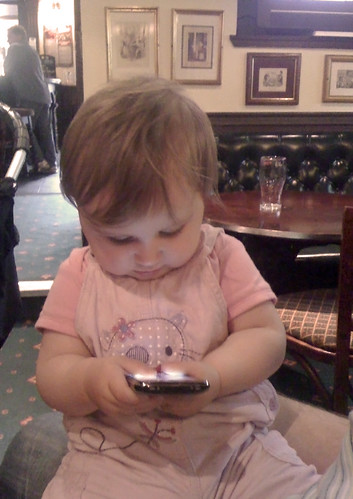4th Sunday in Lent (A)
Picture: cc Ron Wiecki
Sisters and brothers, when was the last time you arranged to meet someone for an outing of some sort? What was it like? What did you have to do? I expect that you probably didn’t think twice about it. It just came naturally to you. But, to be honest, I can’t say the same for myself. I still sometimes find the whole process rather challenging. The reason is that I’m still struggling to adapt to a change in how we do such things. In how we make and keep appointments.
In the past, when people arranged to meet someone, they would typically agree in advance on a specific time and place. The more specific the better. Say, for example, 10:30 AM at Farrer Road MRT Station Control. Very specific. So as to avoid waiting at the wrong place at the wrong time. But habits have changed, haven’t they? These days, when many of us arrange to meet up, we usually tend to keep the details very vague. We might say, for example, ION Mall around 6ish. Now that’s vague. We all know how huge the ION is. And, depending on whom you’re meeting, 6ish can mean anything from 5:01 to 6:59. And not only are we less specific about the details. We also have no qualms about changing what we’ve agreed upon. Even at the last minute.
There is, of course, a very good reason why we feel free to do this. It’s because, these days, everyone carries a phone. So we don’t have to decide ahead of time, exactly where in ION Mall to meet. Or exactly what time to be there. All this can be worked out later. Since we expect to be in continual contact with the person we are meeting anyway. Some of us feel free even to cancel the appointment at the last minute. Or to show up really late. Without feeling too bad about it. Just as long as we call or text or WhatsApp the person to let them know.
I’m sure many of us here find all this very ordinary. Perhaps we haven’t even noticed a change in our habits at all. But–and I’m embarrassed to admit this–I still find it a challenge. I struggle not just to accept the vagueness and the uncertainty. But also to remain in constant contact with the person I’m meeting. You see, I often forget to carry my phone with me. So this is the twofold challenge that I have to face these days. If I want to continue meeting people socially, I have to learn to accept the vagueness. And I also have to remember to keep in constant contact with whomever it is I’m meeting.
Accepting vagueness and keeping in constant contact. This twofold challenge needs to be faced every time we arrange to meet someone. And this is true not just when we meet any ordinary person. It’s true also when we wish to meet God. Notice how, in the second reading today, we are given a very clear instruction. A very particular task. Try to discover what the Lord wants of you. In other words, try to be wherever God wants you to be. Try to arrange to meet God. To do God’s will... To succeed in doing this is to remain in the light. To be able to see God. To fail is to fall into darkness. To remain blind to God’s continual presence and action in our lives and in our world.
But what does it look like when people succeed in meeting God? And what does it look like when they fail? The rest of our readings provide us with very concrete examples. In the first reading, the prophet Samuel has an appointment with God’s will. God sends him on a particular mission. To anoint a king. But notice how vague God’s initial instructions are. All that Samuel is told to do at first is to go and anoint one of Jesse’s sons. Jesse, as we find out later, has eight sons. But Samuel isn’t told exactly which one he’s supposed to anoint. At least not at the start. Even so, the prophet accepts this initial vagueness and goes anyway. He sets out on his rendezvous with God.
And what allows him to succeed in meeting God is that Samuel remains in constant contact with God. As Jesse presents each of his sons in turn, Samuel is continually open to God’s voice. He keeps consulting God. Even allowing God to correct his own initial inclinations. Right until Samuel finally meets the exact person he’s supposed to anoint. Doesn’t this look a lot like how two people might keep talking on their phones until they finally manage to locate each other in a huge and crowded shopping mall? The ability to accept vagueness. And the willingness to keep in constant contact. These are the things that enable the prophet Samuel to do what God wants. To keep his appointment with God’s will. And, in the process, Samuel learns to see with new eyes. With God’s eyes. For God does not see as we see: we look at appearances but the Lord looks at the heart.
In the same way, in the gospel, the man born blind also learns to see with new eyes. I’m referring, of course, not to so much to the healing of the eyes in his head. But more to the opening of the eyes of his heart. The eyes of faith. The eyes that enable this unnamed man to recognise and to acknowledge who Jesus really is. As it was for Samuel, so too for this man. The process is a gradual one. It requires the ability to tolerate vagueness. And a willingness to keep in constant contact with God. At first, when questioned by his neighbours, the man refers to the One who healed him simply as the man called Jesus. A little later, however, he tells the Pharisees that Jesus is a prophet. Then, shortly after that, upon meeting and conversing with Jesus a second time, the man finally comes to see and to accept the Truth. He calls Jesus his Lord. And he worships him.
How does all this come about? We may imagine that this man must have been carrying on an interior conversation with God in his heart. As it was for Samuel, so too with the man born blind. There is an ability to accept vagueness. And a willingness to keep in constant contact. As a result, the man comes to true faith. He manages to keep his appointment with God’s will. He successfully meets God in the person of Jesus the Lord.
In contrast, the Pharisees fail to do the same. And they fail because they cling to the apparent clarity of their preconceived ideas of how God acts. They hear that, in healing the blind man, Jesus had made a paste. This, for them, is equivalent to doing work. Which is forbidden on the Sabbath. Jesus appears to violate the Sabbath. So he must be a sinner. He can’t have been sent by God. There’s just no other possibility. No need to listen to what Jesus might have to say for himself. No need to keep in touch with him. Yet, in rejecting any meaningful conversation with Jesus, in refusing to tolerate even the slightest possibility of uncertainty or vagueness, the Pharisees remain blind to the presence and action of God in their midst. They miss their appointment with God. They fail to do what God wants.
All of which should lead us to reflect upon ourselves. Lent is a time for turning toward God. A time when we prepare ourselves to see more clearly God’s presence and action in our lives. The better to do whatever it is God wants of us. But, in order for us to do this, we must face the same twofold challenge that I find so difficult. We must be willing to tolerate vagueness and to keep in constant contact with God.
Sisters and brothers, we actually do all this quite willingly, without a second thought, every time we arrange to meet our friends (or even our enemies for that matter). We accept vagueness. And we keep in constant contact. How willing are we to do the same for God today?
In the past, when people arranged to meet someone, they would typically agree in advance on a specific time and place. The more specific the better. Say, for example, 10:30 AM at Farrer Road MRT Station Control. Very specific. So as to avoid waiting at the wrong place at the wrong time. But habits have changed, haven’t they? These days, when many of us arrange to meet up, we usually tend to keep the details very vague. We might say, for example, ION Mall around 6ish. Now that’s vague. We all know how huge the ION is. And, depending on whom you’re meeting, 6ish can mean anything from 5:01 to 6:59. And not only are we less specific about the details. We also have no qualms about changing what we’ve agreed upon. Even at the last minute.
There is, of course, a very good reason why we feel free to do this. It’s because, these days, everyone carries a phone. So we don’t have to decide ahead of time, exactly where in ION Mall to meet. Or exactly what time to be there. All this can be worked out later. Since we expect to be in continual contact with the person we are meeting anyway. Some of us feel free even to cancel the appointment at the last minute. Or to show up really late. Without feeling too bad about it. Just as long as we call or text or WhatsApp the person to let them know.
I’m sure many of us here find all this very ordinary. Perhaps we haven’t even noticed a change in our habits at all. But–and I’m embarrassed to admit this–I still find it a challenge. I struggle not just to accept the vagueness and the uncertainty. But also to remain in constant contact with the person I’m meeting. You see, I often forget to carry my phone with me. So this is the twofold challenge that I have to face these days. If I want to continue meeting people socially, I have to learn to accept the vagueness. And I also have to remember to keep in constant contact with whomever it is I’m meeting.
Accepting vagueness and keeping in constant contact. This twofold challenge needs to be faced every time we arrange to meet someone. And this is true not just when we meet any ordinary person. It’s true also when we wish to meet God. Notice how, in the second reading today, we are given a very clear instruction. A very particular task. Try to discover what the Lord wants of you. In other words, try to be wherever God wants you to be. Try to arrange to meet God. To do God’s will... To succeed in doing this is to remain in the light. To be able to see God. To fail is to fall into darkness. To remain blind to God’s continual presence and action in our lives and in our world.
But what does it look like when people succeed in meeting God? And what does it look like when they fail? The rest of our readings provide us with very concrete examples. In the first reading, the prophet Samuel has an appointment with God’s will. God sends him on a particular mission. To anoint a king. But notice how vague God’s initial instructions are. All that Samuel is told to do at first is to go and anoint one of Jesse’s sons. Jesse, as we find out later, has eight sons. But Samuel isn’t told exactly which one he’s supposed to anoint. At least not at the start. Even so, the prophet accepts this initial vagueness and goes anyway. He sets out on his rendezvous with God.
And what allows him to succeed in meeting God is that Samuel remains in constant contact with God. As Jesse presents each of his sons in turn, Samuel is continually open to God’s voice. He keeps consulting God. Even allowing God to correct his own initial inclinations. Right until Samuel finally meets the exact person he’s supposed to anoint. Doesn’t this look a lot like how two people might keep talking on their phones until they finally manage to locate each other in a huge and crowded shopping mall? The ability to accept vagueness. And the willingness to keep in constant contact. These are the things that enable the prophet Samuel to do what God wants. To keep his appointment with God’s will. And, in the process, Samuel learns to see with new eyes. With God’s eyes. For God does not see as we see: we look at appearances but the Lord looks at the heart.
In the same way, in the gospel, the man born blind also learns to see with new eyes. I’m referring, of course, not to so much to the healing of the eyes in his head. But more to the opening of the eyes of his heart. The eyes of faith. The eyes that enable this unnamed man to recognise and to acknowledge who Jesus really is. As it was for Samuel, so too for this man. The process is a gradual one. It requires the ability to tolerate vagueness. And a willingness to keep in constant contact with God. At first, when questioned by his neighbours, the man refers to the One who healed him simply as the man called Jesus. A little later, however, he tells the Pharisees that Jesus is a prophet. Then, shortly after that, upon meeting and conversing with Jesus a second time, the man finally comes to see and to accept the Truth. He calls Jesus his Lord. And he worships him.
How does all this come about? We may imagine that this man must have been carrying on an interior conversation with God in his heart. As it was for Samuel, so too with the man born blind. There is an ability to accept vagueness. And a willingness to keep in constant contact. As a result, the man comes to true faith. He manages to keep his appointment with God’s will. He successfully meets God in the person of Jesus the Lord.
In contrast, the Pharisees fail to do the same. And they fail because they cling to the apparent clarity of their preconceived ideas of how God acts. They hear that, in healing the blind man, Jesus had made a paste. This, for them, is equivalent to doing work. Which is forbidden on the Sabbath. Jesus appears to violate the Sabbath. So he must be a sinner. He can’t have been sent by God. There’s just no other possibility. No need to listen to what Jesus might have to say for himself. No need to keep in touch with him. Yet, in rejecting any meaningful conversation with Jesus, in refusing to tolerate even the slightest possibility of uncertainty or vagueness, the Pharisees remain blind to the presence and action of God in their midst. They miss their appointment with God. They fail to do what God wants.
All of which should lead us to reflect upon ourselves. Lent is a time for turning toward God. A time when we prepare ourselves to see more clearly God’s presence and action in our lives. The better to do whatever it is God wants of us. But, in order for us to do this, we must face the same twofold challenge that I find so difficult. We must be willing to tolerate vagueness and to keep in constant contact with God.
Sisters and brothers, we actually do all this quite willingly, without a second thought, every time we arrange to meet our friends (or even our enemies for that matter). We accept vagueness. And we keep in constant contact. How willing are we to do the same for God today?




